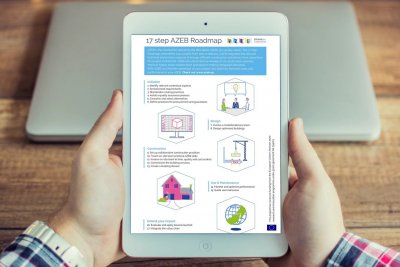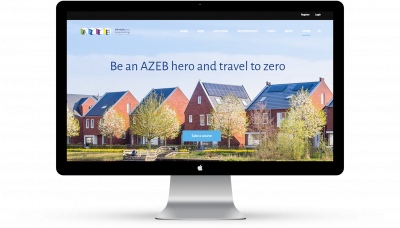eERG è il gruppo di ricerca sull'efficienza negli usi finali dell'energia
attivo dal 1996 presso il Politecnico di Milano
 Documenti allegati alla pagina Progetti - AZEB (1):
Documenti allegati alla pagina Progetti - AZEB (1):
 AZEB project: end-users behaviour in nearly Zero Energy Buildings
AZEB project: end-users behaviour in nearly Zero Energy Buildings
Data: 22-05-2018 13:05
Tipo di file: documento PDF
Dimensione: 3,79 MB
AZEB - Affordable Zero Energy Buildings
AZEB (Affordable Zero Energy Buildings) is a EU project funded by the Horizon 2020 research and innovation program which aims to foster the diffusion of nearly Zero Energy Buildings (nZEBs) through the definition of a methodology to reduce costs along the entire lifecycle of the building, in parallel with an optimization of the energy, comfort and environmental performance.
In the 30-month project 8 partners from Italy, Spain, Bulgaria, Germany, France and The Netherlands work together till October 2019.
The main steps of the AZEB project are:
- Evaluate available experience and solutions
- Create a common methodology for cost reduction
- Apply the methodology to demonstration projects
- Finalise the methodology including lessons learned
- Disseminate the results
AZEB Projectpartners
- DNA in de Bouw – The Netherlands (projectleader)
- OHL (Obrascon Huarte Lain) – Spain
- Tecnalia (Fundacion Tecnalia Research & Innovation) – Spain
- Visesa (Vivienda y Suelo de Euskadi) – Spain
- Passive House Institute – Germany
- Armines (Association Pour La Recherche Et Le Developpement Des Methodes Et Processus Industriels) – France
- Oberon Konzeptbau – Bulgaria
- Politecnico di Milano (eERG-PoliMI) – Italy
Contacts
Prof. Lorenzo Pagliano
Silvia Erba, PhD
At eceee 2019 Summer Study “Is efficient Sufficient?” Prof. Lorenzo Pagliano discusses how new «smart districts» and city re-design should and might include efficiency and sufficiency-enabling physical features with a focus on the emerging issue of summer comfort under a warming climate. A preliminary relevant question is if current policies are able to promote opportunities or there is a need to adapt those policies and how. Low cost technologies and design options for zero energy buildings developed in AZEB are the main topic of the presentation.
https://www.youtube.com/embed/lmwhZtMl-D8
Present and future potential of natural night ventilation in nZEBs. S. Erba, A. Sangalli, L. Pagliano 2019
During the international conference “SBE19 - Resilient Built Environment for Sustainable Mediterranean Countries” organised by PoliMi (Campus Leonardo, Politecnico di Milano) from 4th to 5th September 2019, Dr. Silvia Erba presented the peer-reviewed paper “Present and future potential of natural night ventilation in nZEBs” which investigates the effects and the potential of natural night ventilation, as a strategy to reduce the energy need for cooling even taking into account the evolution of surrounding urban area with the exacerbation of urban heat island under future weather projections.
Directive 2010/31/EU states that “Recent years have seen a rise in the number of air-conditioning systems in European countries. This creates considerable problems at peak load times, increasing the cost of electricity and disrupting the energy balance. Priority should be given to strategies which enhance the thermal performance of buildings during the summer period. To that end, there should be focus on measures which avoid overheating, such as shading and sufficient thermal capacity in the building construction, and further development and application of passive cooling techniques, primarily those that improve indoor climatic conditions and the microclimate around buildings”.
The study on natural night ventilation was developed within the framework of the project AZEB which explores low cost strategies to realize affordable nearly zero energy buildings.
https://iopscience.iop.org/article/10.1088/1755-1315/296/1/012041
Energy consumption, thermal comfort and load match: study of a monitored nearly Zero Energy Building in Mediterranean climate”. S. Erba, L. Pagliano, S. Shandiz, M. Pietrobon 2019
Several definitions of Zero Energy Buildings (ZEB) exist in literature and different implementations of the term can be found in National laws/regulations. The differences among the Member States in nomenclature and definition of the main indicators often lead to incomparable results and difficulties in transfer and diffusion of technologies across the EU. The paper aims to investigate the topic of ZEB by clarifying the meaning of nearly ZEB and Net ZEB through the application of the definitions in a case study of a high-performance building (certified Passivhaus) located in Sicily, Italy.
The importance of using a proper nomenclature and definitions has been consistently emphasised in AZEB project, especially in deliverable D2.1 "Definition of indicators and essessment methods for cost effective nZEB and Energy+ Buildings" which provides definitions for the main relevant aspects of building performance and building costs. Also, it shows some available methods to allow these aspects to be evaluated by indicators and relevant measuring units.
https://iopscience.iop.org/article/10.1088/1757-899X/609/6/062026
AZEB launches e-learning with knowledge for an affordable nZEB
AZEB Learn helps clients and professionals in the building sector with developing an affordable nZEB using e-learning. This new online platform bundles the knowledge and tools in a step-by-step structure that simplifies the realization of an affordable nZEB. Those interested can now start with the first free course in the English language that covers the AZEB roadmap, associated resources and additional knowledge. AZEB Learn is an important result of the EU project AZEB (Affordable Zero Energy Buildings), executed in Italy by eERG (PoliMi).

The current lack of knowledge in the market makes it difficult to develop affordable and high-quality NZEBs. The new European legislation for nearly zero energy building from 2021 is expected to encourage the acquisition of new knowledge. The current times of social distance also increase the opportunities for e-learning. AZEB Learn responds to this. It is the result of the intensive collaboration of 8 organizations from 6 European countries for 3 years. The AZEB method saves the market millions of euros by scanning, analyzing and testing a large amount of available solutions in Europe for cost-effective NZEBs and integrating the best in the AZEB roadmap. This encourages, thanks to the support from the EU, nZEB projects that can guarantee high performance for energy, comfort and finance and gain more value for less money.
Structure and content of AZEB Learn
AZEB Learn covers all relevant topics for a nearly zero energy building with practical suggestions for implementations, supplemented with information sources from experienced and well-known AZEB partner organizations. Knowledge is integrated about definition of comfort objectives, design, building services, renewable energy sources, commissioning, contracting, lean practices, project management, project development, all with a focus on nZEBs. This enormous amount of experience-based practical and scientific knowledge guarantees state-of-the-art content. The teaching material pays specific attention to the costs of an nZEB project and its optimization. Examples are also given of validated cases with significant effects on the financial, social and environmental performance of buildings.
On AZEB Learn it is easy to navigate from helicopter view to specific details and back. The student can test her/his own knowledge with short tests. In the long term an online community of colleagues and experts will be available to get customized answers to specific questions online. More teaching materials are also added, in more languages, paid and free. An account can be created for free at https://azeb.eu/learn.
EU project ends, AZEB continues
The EU project will be completed by May 2020, but AZEB continues. Dutch projectleader DNA in de Bouw owns the e-learning platform and its sister foundation KERN knowledge institute for energy-neutral building manages it. KERN coordinates the development of free online training and paid online certificate programs, as well as their marketing and sales. Other AZEB partners may collaborate with DNA in developing and delivering courses. The first paid AZEB online certificate program is expected to be launched in 2021. AZEB will also offer international consultancy for affordable NZEBs.
The time and perhaps financial investment to gain online knowledge easily recoups a student, his employer and client through an improved project implementation and profitability of an affordable BENG. There are currently no comparable teaching methods and materials on the market.
About AZEB and eERG (PoliMi)
eERG is partner in the EU project AZEB: Affordable Zero Energy Buildings. Eight partners from Italy, Spain, Bulgaria, Germany, France and The Netherlands work together till mid 2020 to develop an integrated methodology for cost reduction of nearly zero energy buildings. See www.azeb.eu for more information.
Horizon 2020 program
AZEB has received funding from the European Union’s Horizon 2020 research and innovation programme under grant agreement number 754174. With AZEB an amount of nearly 2 million euro is involved.

AZEB Learn is the new online platform that bundles the knowledge and tools in a step-by-step structure that simplifies the development of an affordable nZEB.
The AZEB method saves the market millions of euros because a large amount of available solutions in Europe for cost-effective nZEBs have been scanned, analyzed and tested. The best are integrated into the AZEB roadmap.
This press release reflects only the author’s view, the European Agency and Commission are not responsible for any use that may be made of the information it contains.
